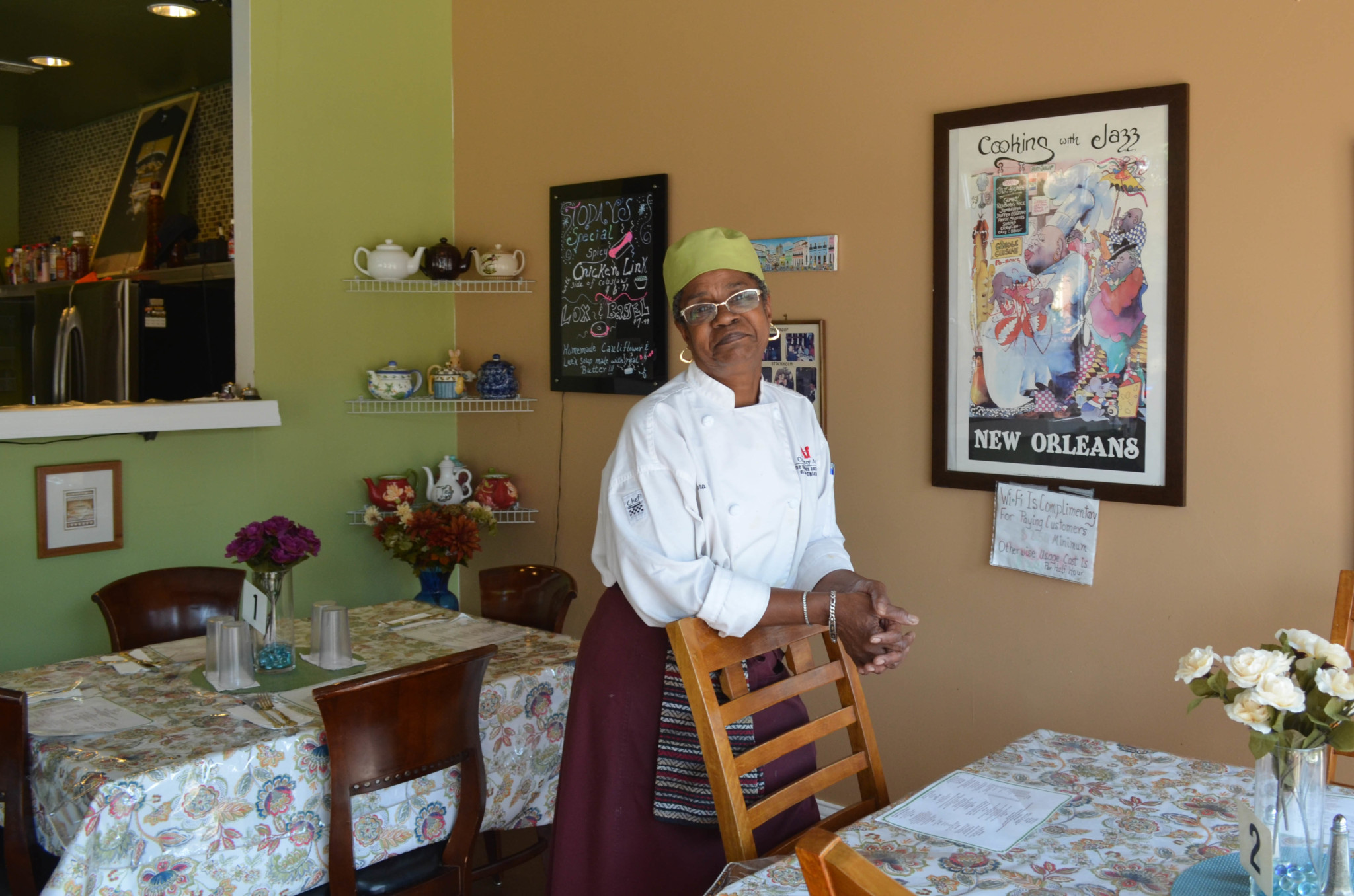Because I have no fears of saying someone who hasn’t even boiled an egg can cook—and I can teach them how––that is where I feel I have strength.”
Since Ranjana Bhargava settled in the Jackson Park Highlands neighborhood in 1978, she’s taught healthy cooking in local middle schools, led neighborhood watches (and earned recognition from the U.S. Criminal Justice Authority), led nonprofits, supported women affected by incarceration and domestic abuse, and, of course, run her famed cooking courses.
Ranjana says that when she emigrated from India forty-nine years ago, she couldn’t cook a thing. And yet, she credits her ability to teach others to with this unfamiliarity. With encouragement from her husband and advice from her mother––both on how to cook, and how to teach cooking––Ranjana started teaching at the former Hyde Park Co-op (now a Treasure Island) in the 1970s.
She was inspired further by the people that first connected her to South Shore: the two children she raised in South Shore; Anurima Bhargava, the Chief of the Educational Opportunities Section of the U.S. Department of Justice’s Civil Rights Division, and Prashant Bhargava, an artist and highly acclaimed filmmaker who died in 2015.
Ranjana has seen poverty and lack of opportunity take its toll on her neighborhood. Three years ago, her home was burglarized five times in two weeks by a group of teenagers—who, she notes, had been displaced by a Section 8 housing closure. Though the ordeal brought her closer to her neighbors, she says the trauma surpassed any silver lining.
“Hope is a very hard thing,” Ranjana muses.
Still, she hopes. Ranjana tells me that she hopes to see more support for culinary education from the City of Chicago and Chicago Public Schools, but in the meantime, she continues to teach her courses to South Shore and South Chicago residents.
And, as she explains to me, she hopes to write more about her recipes and the stories behind them. She tells me of working with battered women through Apna Ghar (Hindi for “Our Home”), a shelter for immigrant women and victims of domestic abuse that she founded and opened in in 1989.
“Many times, when you brought them home, they were starving—and what would you cook for them that they could eat, and could make them feel the comfort? So sometimes, I feel by helping the oppressed, I understood what life can be with a little bit of nurturance.” (Christopher Good)
Ranjana’s Indian Cooking Lessons, 6730 S. Euclid Ave. By appointment; registration required. (773) 355-9559. indiancookingclass.com. ranjana@indiancookingclass.com
South Shore Drill Team
You might not know the South Shore Drill Team by name, but odds are you’ve seen them around: whether in this year’s Bud Billiken Parade, in Obama’s second inaugural parade, in the 2013 Macy’s Thanksgiving Day Parade, or in the parade scene in Ferris Bueller’s Day Off. Since it was founded by former CPS teacher Arthur Robertson in 1980, the South Shore Drill Team has been dazzling crowds and changing the lives of its members.
The South Shore Drill Team’s routines are precise, unique, and difficult; often combining dance, tumbling, and rifle-throwing or flag-twirling. Nonetheless, the team is brimming with energy—so much so that Steven Washington, the team’s outreach director, said he could feel the their energy off his TV when he watched a tape of their Bud Billiken performance. It’s this same energy that led to the team’s 1992 and 2011 wins at the Winter Guard International World Championship.
I experienced this spirit firsthand at a team practice at the Gary Comer Youth Center in early September, as members of all levels prepared for upcoming performances. Members of the Big Guard Flag Boys, one of the team’s most advanced groups, did full splits as a warm-up before going into complex flag-twirling and dance routines. Jeff Lovett, a twenty-six year-old performer and instructor who has been involved with the team since he was a child, spun and threw a rifle replica twenty feet into the air––and effortlessly caught it.
Nigel Lyles, a twenty-one year-old member of the Big Guard Rifles, said that South Shore’s uniqueness was part of what made them the best. As he put it: “You ain’t never seen anything like this.”
The same is true of many of the kids, for whom South Shore is their first exposure to drill. “We take everybody in, because you’ve probably never had any experience with this,” Washington said.
The South Shore Drill Team doesn’t just cultivate amazing performers: it works to help its members develop life skills and keep them committed to education. The team has educational support programs, and all of its members have graduated with their high school class since 2012.
“We’re saving kids’ lives, keeping them out of the streets,” said Lovett. “We’re a winning team.” (Adia Robinson)
South Shore Drill Team, Gary Comer Youth Center. 7200 S. Ingleside Ave. Daily, 8:30am–9pm. $25 registration fee, $20 per month dues. (773) 752-7830. southshoredrillteam.org
Chef Sara’s Café

Wikipedia defines café as a place where customers can chat about current topics; a place where information can be exchanged. Chef Sara’s Café goes above and beyond this definition. The South Shore staple has served freshly prepared breakfasts and light lunch fare for six years while helping to fill the void left by South Shore’s official status as a food desert.
As the formally trained culinary chef said, “Everybody came this way because they had no choice to get food––any fresh food––anywhere but here.”
“Anything they’ve suggested, if I could handle it, I’d put in here for my customers…They are the ones that made up the menu, believe it or not. I just listened to what they wanted and then I put food together for them,” she added.
Chef Sara’s Café offers fluffy omelets, pressed-to-order paninis, homemade soups and chili, and the newest addition, chicken and waffles. But the house specialty is Sara’s shrimp and grits—served buttery or cheesy; mild or spicy. The café’s open and welcoming air isn’t just on the plate, though: there are the wispy draperies, the exposed brick and eclectic art, the jazz background music, and added touches like shakers of pink Himalayan sea salt and fresh flowers.
As Wikipedia suggests, Sara’s is more than a place to eat: it also serves as a meeting place for small working luncheons and larger community meetings. Sara recently began hosting Exchange Ideas, regular meetings organized by a local group called The Planning Coalition, to discuss topics of concern for the area. It’s this welcoming attitude that puts Sara’s Café among the best of South Shore. (Nicole Bond)
Chef Sara’s Café, 7201 S. Exchange Ave. Tuesday–Friday, 7am–4pm; Saturday, 10am–3pm. (773) 359-4637. chefsarascafe.com
Majani Vegan Restaurant and Catering

Majani Vegan Restaurant and Catering, South Side chefs Tsadakeeyah and Nasya Emmanuel’s latest and largest project, sits just steps from the South Shore Metra stop on Currency Avenue. On the evening of August 22, a vivid sunset set the wood-framed interior ablaze.
Our first course was a heaping platter of dough-battered and deep-fried cauliflower florets. The cauliflower was supple, the sauce tangy, the batter crisp—even with pauses to sip at the signature sorrel drinks, the stack was gone in minutes. “I don’t even miss Harold’s,” my companion exclaimed between chews.
Majani is an extension of the Emmanuels’ longtime catering service, and the chefs “bet their last dime” on the restaurant’s June opening. They aim to provide a healthy dining option for their South Shore neighborhood, explore the range of flavors within the African diaspora, and to feature local food and resources whenever possible. Majani is part of an uptick in plant-based eateries in the neighborhood: Betty Bot Bakery, a vegan and gluten-free bakery popular at the Logan Square and 61st Street farmers markets, opened a South Shore Avenue storefront on August 5.
Tuesdays at Majani are Taco Tuesdays. The options for fillings are extensive, but we settled on jerk tofu, black-eyed pea patties, and homemade seitan po’ boy “meat.” A generous helping of avocado, salsa, and lettuce enhanced the black-eyed pea patties, while the jerk tofu and po’ boy meats retained the textures and flavors of their inspirations. Cubed and roasted sweet potato fries, served with another generous helping of barbecue sauce, complimented the tacos perfectly.
Of course, we only tried a fraction of Majani’s menu, which changes daily. A diner next to us ordered a mouth-watering plate of fried grits; another ordered the restaurant’s signature raw food plate; another, that night’s spaghetti special.
As for Majani’s future? The restaurant saw a steady stream of diners over the course of the evening, and its latest Facebook post reads hopefully: “Majani is a small business with big dreams. More to come…” (Lois Biggs)
Majani Vegan Restaurant & Catering, 7167 S. Exchange Ave. Tuesday–Saturday, 11am–10pm; Sunday, 10am–5pm. (773) 359-4019. majani.biz
Muntu Dance Theatre of Chicago
Muntu Dance Theatre of Chicago, one of the longest-standing Black dance companies in the city, has an ethic of cross-pollination––it takes inspiration from folklore across the African diaspora, and references everything from hip-hop to dancehall.
But if the group’s vision is broad, then its mission is clear: “to focus on [and] share the beauty that Africa has to offer,” in the words of executive director Sekou Conde. A former djembe player in the company’s musical ensemble, Conde has been involved with Muntu since he joined as a child in 1978.
In the forty-five years since Muntu was founded, its scope has broadened beyond the South Side: the group holds workshops across the country and has performed as far away as Ghana and Brazil. But ACE (Arts for Community Empowerment), an after-school program that teaches children the techniques and traditions of African dance, remains one of its greatest impacts.
It’s a philosophy for both the classroom and the stage, as Conde explains: “In between a lot of the pieces, we communicate with the audiences, so that we can say where this comes from, what is the importance of this. [Often] we’ll do proverbs, some words of wisdom that we kind of share that helps all of us in life at some point.”
Muntu draws its name from the Bantu term for “essence of humanity.” If you look for it, you can see this essence from any angle: the vivid costumes, the intricate dance routines, the báta rhythms, and the messages that hold it all together. (Christopher Good)
Muntu Dance Theatre of Chicago, 1809 E. 71st St. Suite 203. (773) 241-6080. muntu.com
Support community journalism by donating to South Side Weekly

